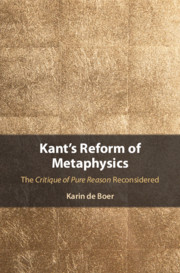Book contents
- Kant’s Reform of Metaphysics
- Kant’s Reform of Metaphysics
- Copyright page
- Contents
- Acknowledgments
- Abbreviations
- Introduction
- Chapter 1 Wolff, Crusius, and Kant
- Chapter 2 The “Thorny Paths of Critique”
- Chapter 3 Ontology, Metaphysics, and Transcendental Philosophy
- Chapter 4 Things in Themselves, Transcendental Objects, and Monads
- Chapter 5 The 1781 Transcendental Deduction of the Pure Concepts of the Understanding
- Chapter 6 The Schematism of the Pure Understanding
- Chapter 7 Transcendental Reflection
- Chapter 8 Kant’s Projected System of Pure Reason
- Conclusion
- Bibliography
- Index of Names
- Index of Subjects
Chapter 5 - The 1781 Transcendental Deduction of the Pure Concepts of the Understanding
Published online by Cambridge University Press: 20 August 2020
- Kant’s Reform of Metaphysics
- Kant’s Reform of Metaphysics
- Copyright page
- Contents
- Acknowledgments
- Abbreviations
- Introduction
- Chapter 1 Wolff, Crusius, and Kant
- Chapter 2 The “Thorny Paths of Critique”
- Chapter 3 Ontology, Metaphysics, and Transcendental Philosophy
- Chapter 4 Things in Themselves, Transcendental Objects, and Monads
- Chapter 5 The 1781 Transcendental Deduction of the Pure Concepts of the Understanding
- Chapter 6 The Schematism of the Pure Understanding
- Chapter 7 Transcendental Reflection
- Chapter 8 Kant’s Projected System of Pure Reason
- Conclusion
- Bibliography
- Index of Names
- Index of Subjects
Summary
Focusing on its 1781 version, Chapter 5 interprets the transcendental deduction in light of Kant’s overall investigation into the conditions under which metaphysics is possible. Whereas most commentators take the text to be mainly concerned with the conditions of possibility of empirical cognition, it seeks to demonstrate that the various strands of Kant’s investigation primarily aim to identify the conditions under which categories can be used to produce objects of a priori cognition as such. On Kant’s account, categories can contribute to the production of such objects only if they function as a priori rules for the thoroughgoing unification of successive representations, which is not the case if they are used to determine alleged objects such as the soul, the world as such, and God. Thus, I contend that the transcendental deduction passes a balanced judgment on Wolff’s unqualified affirmation of the possibility of a priori cognition of objects and Hume’s unqualified rejection of the same.
Keywords
- Type
- Chapter
- Information
- Kant's Reform of MetaphysicsThe <I>Critique of Pure Reason</I> Reconsidered, pp. 127 - 162Publisher: Cambridge University PressPrint publication year: 2020



